
International Journal of Assessment Tools in Education
Scope & Guideline
Fostering Discourse to Elevate Assessment Standards
Introduction
Aims and Scopes
- Psychometric Evaluation and Validation:
The journal publishes studies that develop and validate assessment tools, ensuring their reliability and validity across diverse educational settings and populations. - Comparative Assessment Methodologies:
Research comparing various assessment methods, including classical test theory, item response theory, and Bayesian approaches, is a central theme, providing insights into the effectiveness and efficiency of different evaluation strategies. - Innovative Assessment Strategies:
The journal encourages the exploration of novel assessment strategies, including game-based assessments, online tools, and adaptive testing, reflecting the evolving landscape of education technology. - Differential Item Functioning Analysis:
A significant focus on detecting and addressing differential item functioning (DIF) highlights the journal's commitment to equity in assessment practices, ensuring that assessments are fair and unbiased across different demographic groups. - Impact of Educational Contexts:
The journal emphasizes the role of contextual factors, such as socioeconomic status and cultural background, in shaping assessment outcomes, thereby promoting a comprehensive understanding of educational measurement.
Trending and Emerging
- Impact of Technology on Assessment:
There is an increasing interest in how technology, particularly digital tools and online assessments, influences educational outcomes and assessment practices, emphasizing the integration of technology in educational settings. - Adaptation of Assessment Tools for Diverse Populations:
Emerging research focuses on adapting and validating assessment tools for various cultural and linguistic groups, highlighting the importance of inclusivity and fairness in educational measurement. - Exploration of Student Engagement and Assessment:
Research examining the intersection of student engagement and assessment practices is gaining prominence, reflecting a growing awareness of how assessment strategies can enhance or hinder student motivation and learning outcomes. - Data-Driven Decision Making in Education:
The trend towards using data analytics to inform assessment practices and educational decisions is increasingly evident, as researchers explore how data can be leveraged to improve teaching and learning. - Formative Assessment Strategies:
There is a rising focus on formative assessment practices that support ongoing learning and provide feedback, as educators seek to implement assessment strategies that foster student growth rather than merely evaluate performance.
Declining or Waning
- Traditional Assessment Methods:
There is a noticeable decrease in studies focused solely on traditional assessment methods, such as paper-and-pencil tests, as the field increasingly embraces innovative and technology-enhanced assessment strategies. - General Educational Psychology:
Research that broadly addresses general educational psychology concepts without direct ties to assessment tools or methodologies is becoming less common, reflecting a shift towards more specialized and targeted studies. - Descriptive Studies on Assessment Practices:
Descriptive studies that merely outline existing assessment practices without offering new insights or methodologies are less frequently published, indicating a preference for research that contributes to theoretical advancements or practical applications.
Similar Journals
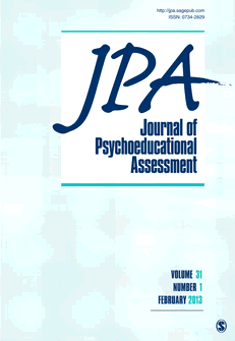
JOURNAL OF PSYCHOEDUCATIONAL ASSESSMENT
Empowering professionals through cutting-edge research in psychoeducation.The JOURNAL OF PSYCHOEDUCATIONAL ASSESSMENT, published by SAGE PUBLICATIONS INC, serves as a leading platform for disseminating high-quality research in the fields of clinical psychology and education. With its ISSN 0734-2829 and E-ISSN 1557-5144, this distinguished journal has been at the forefront of advancing knowledge since its inception in 1983, and it continues to publish innovative studies aimed at enhancing psychoeducational assessment practices. Recognized in the 2023 category quartiles as Q2 in Clinical Psychology, Education, and miscellaneous Psychology, the journal holds significant rankings in Scopus, with Education at rank #479, Clinical Psychology at #126, and General Psychology at #100, reflecting its substantial impact in the social sciences. Although it does not offer Open Access, the valuable insights provided in its articles contribute meaningfully to the ongoing discourse among researchers, professionals, and students alike. The JOURNAL OF PSYCHOEDUCATIONAL ASSESSMENT is an essential resource for those seeking to enhance their understanding of psychoeducational methods and assessments, ultimately aiming to improve educational outcomes and clinical practices.
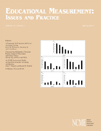
Educational Measurement-Issues and Practice
Navigating the Complexities of Educational Assessment.Educational Measurement-Issues and Practice, published by WILEY, stands as a premier journal in the field of education, recognized for its commitment to advancing understanding of measurement issues and methodologies in educational contexts. Established in 1982, this journal spans over four decades of scholarly contributions, maintaining a remarkable Q1 status within the Education category as per the 2023 metrics, and ranking #407 out of 1543 in Scopus's Education domain, placing it in the top 73rd percentile. It features a range of articles that address critical issues concerning educational assessment practices, policy implications, and innovative measurement methodologies, aimed at professionals, researchers, and students dedicated to enhancing educational assessment frameworks. With its ongoing focus on contemporary challenges and developments in the field, Educational Measurement-Issues and Practice plays a crucial role in shaping effective educational policies and practices worldwide, making it an essential resource for anyone involved in educational research and measurement.

International Journal of Educational Research and Innovation
Exploring New Horizons in Learning and TeachingThe International Journal of Educational Research and Innovation, published by UNIV PABLO OLAVIDE, FAC CIENCIAS SOCIALES in Spain, stands at the forefront of contemporary educational research. With a dedicated focus on innovative practices and theories in education, this open-access journal has been instrumental in disseminating valuable knowledge since its inception in 2014. As part of the top quartile (Q2) in the category of Education for 2023, it has achieved an impressive Scopus ranking of #281 out of 1543, positioning it within the 81st percentile of Social Sciences - Education. Scholars, educators, and policy-makers benefit from its wide-ranging articles that push the boundaries of educational effectiveness and innovation. Researchers can freely access all content, fostering a collaborative and inclusive academic environment, further enriching the global discourse on educational practices. With its commitment to advancing knowledge and understanding in the field, the journal is poised to impact the educational landscape significantly.
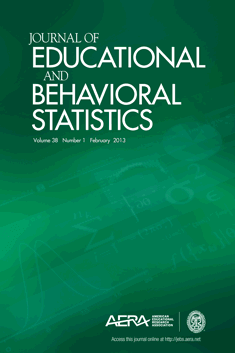
JOURNAL OF EDUCATIONAL AND BEHAVIORAL STATISTICS
Empowering Research through Behavioral StatisticsJOURNAL OF EDUCATIONAL AND BEHAVIORAL STATISTICS, published by SAGE Publications Inc, stands as a pivotal resource in the domains of education and social sciences. With an impressive impact factor reflecting its influence, it is categorized in the esteemed Q1 quartile for both Education and Social Sciences (miscellaneous), positioning it among the top-tier journals in these fields. The journal, bearing the ISSN 1076-9986 and E-ISSN 1935-1054, prides itself on disseminating rigorous research and innovative methodologies applicable to educational and behavioral statistics. Since its inception in 1996, it has continually evolved, featuring cutting-edge studies that address contemporary challenges in educational assessment and statistical techniques. Researchers, educators, and students alike will find invaluable insights within its pages, making it an essential publication for those seeking to advance their understanding and application of statistical methods in education. The journal's commitment to excellence and relevance ensures it remains a cornerstone for scholarly discourse through 2024 and beyond.

Voprosy Obrazovaniya-Educational Studies Moscow
Empowering Scholars to Shape Tomorrow's LearningVoprosy Obrazovaniya-Educational Studies Moscow is a prominent peer-reviewed journal in the field of education, published by the esteemed NATIONAL RESEARCH UNIVERSITY HIGHER SCHOOL OF ECONOMICS in the Russian Federation. This journal, identified by ISSN 1814-9545, has established itself as a vital resource for researchers and educators since its inception in 2012 and has transitioned to an Open Access model since 2014, enabling wider dissemination of academic research. With an impressive rank of #743 out of 1543 in the Social Sciences - Education category and a current Q3 quartile ranking, the journal acts as a significant platform for exploring innovative educational practices and policies. Covering a broad range of topics within educational studies, the journal is committed to advancing pedagogical knowledge and fostering scholarly dialogue among academics, practitioners, and students alike. As it continues to converge from 2012 to 2024, Voprosy Obrazovaniya serves as a crucial outlet for critical insights and research findings that shape the future of education on both local and global scales.
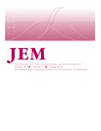
JOURNAL OF EDUCATIONAL MEASUREMENT
Empowering Educators through Rigorous AssessmentJOURNAL OF EDUCATIONAL MEASUREMENT, published by WILEY, stands as a pivotal resource in the fields of education and psychology, with a strong emphasis on the systematic evaluation of educational processes and instruments. With the ISSN 0022-0655 and E-ISSN 1745-3984, this journal has been contributing to the literature since 1964 and continues to thrive into 2024, reflecting its long-standing dedication to improving educational measurement practices. The journal holds impressive standings with 2023 category quartiles of Q1 in Education and Q2 in multiple psychology categories, demonstrating its significance in applied psychological research and educational development. Although it does not currently offer open access, its well-curated content appeals to researchers, professionals, and students seeking insights into measurement theories, practices, and innovations. With robust metrics, including a diverse range of Scopus ranks across various psychological disciplines, the JOURNAL OF EDUCATIONAL MEASUREMENT is indispensable for anyone looking to advance their knowledge and application of educational assessments and methodologies.
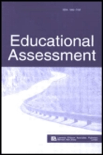
Educational Assessment
Driving Change in Assessment MethodologiesEducational Assessment is a prestigious journal dedicated to the latest advancements and research in the field of education, with a particular focus on the evaluation and assessment practices that shape educational policies and student outcomes. Published by Routledge Journals, Taylor & Francis Ltd, this influential journal boasts an impressive Q1 rating in Education for 2023, highlighting its critical role in disseminating high-quality research. With an ISSN of 1062-7197 and an E-ISSN of 1532-6977, Educational Assessment has been a vital resource for scholars and practitioners since its inception, spanning from 1993 to 1995 and again from 2004 to 2024. Researchers in this field can utilize findings published in this journal to inform best practices, influence pedagogical techniques, and drive improvements in assessment methodologies. Although it is not an Open Access journal, Educational Assessment is recognized for its rigorous peer-review process and valuable contributions to the education landscape, making it an essential read for anyone interested in educational research and assessment strategies.
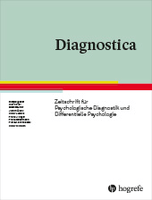
DIAGNOSTICA
Fostering discourse in the realm of clinical psychology.DIAGNOSTICA is a prominent international journal published by Hogrefe Verlag, focusing on Clinical Psychology. With its ISSN 0012-1924 and E-ISSN 2190-622X, DIAGNOSTICA has carved a niche for itself within the academic community, particularly in clinical psychological research and practice. The journal has been a vital platform for sharing innovative research findings since its inception in 1996 and continues to contribute to the field with its convergence running through to 2024. Despite being categorized as Q3 in the 2023 Clinical Psychology ranking, it serves an important role in disseminating valuable insights and encourages discourse among professionals and scholars. Researchers, practitioners, and students can benefit from its rich repository of studies encompassing various aspects of psychological assessment, diagnosis, and treatment methodologies. Located in Göttingen, Germany, DIAGNOSTICA remains dedicated to advancing the understanding of psychological well-being, thus reinforcing its significance in clinical practice and mental health research.

Revista de Psicodidactica
Transforming Education with Cutting-Edge InsightsRevista de Psicodidactica, published by ELSEVIER ESPAÑA, is a leading academic journal dedicated to the fields of Developmental and Educational Psychology. With an impressive impact factor reflecting its high-quality research, the journal has achieved a commendable Q2 ranking in its field for Developmental and Educational Psychology and a Q1 ranking in Education as of 2023. Notably, it holds a significant position in Scopus Ranks, placing in the top 90th percentile in Social Sciences Education and the 84th percentile in Psychology. Launched in 2005, the journal is committed to advancing knowledge in educational practices through empirical research and theoretical frameworks. It provides a vital platform for researchers, educators, and students in Spain and beyond, fostering an open exchange of ideas and innovative approaches to learning and development. Though it is not an open-access publication, it remains a compelling source of contemporary findings for those invested in enhancing educational outcomes.

TPM-Testing Psychometrics Methodology in Applied Psychology
Exploring Innovative Methodologies in Psychological TestingTPM-Testing Psychometrics Methodology in Applied Psychology is a distinguished journal published by CENTRO INFORMAZIONE SCIENTIFICA ECONOMICA SOCIALE-CISES SRL in Italy, focusing on the vital intersection of psychometrics and applied psychology. With an ISSN of 1972-6325, this journal has been an essential resource since its inception in 2005, providing an academic platform for researchers, professionals, and students dedicated to advancing the field. The journal currently holds a Q3 ranking in both Applied Psychology and Psychology (miscellaneous) within the prestigious Scopus database, highlighting its commitment to scholarly excellence and relevance. Although it is not an open-access journal, TPM is a valuable source for rigorous methodologies and innovative applications in psychological testing and assessment. As the field continues to evolve, TPM seeks to address contemporary challenges and promote interdisciplinary collaboration, making it a crucial contributor to the landscape of applied psychology research and practice.